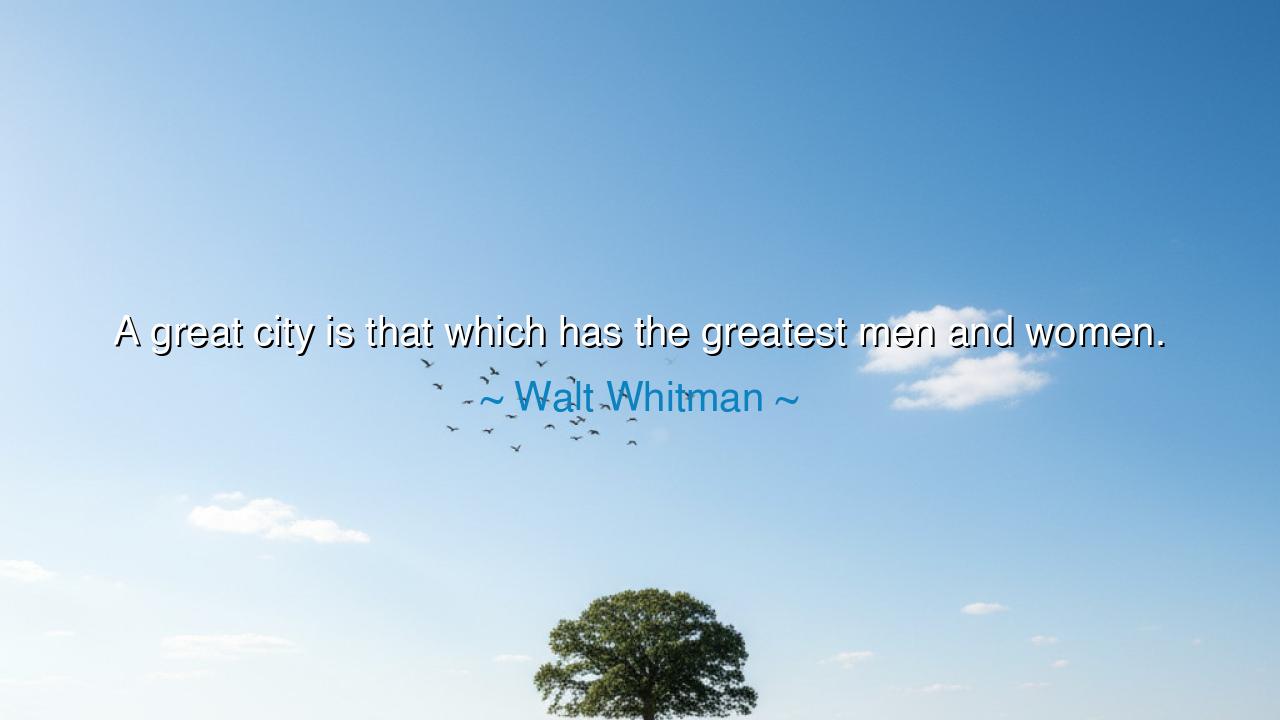
A great city is that which has the greatest men and women.






Hear, O children of the future, the noble words of Walt Whitman: “A great city is that which has the greatest men and women.” In this proclamation, the poet of democracy teaches that the measure of a city lies not in its towers nor its wealth, but in the character of its people. For streets may gleam with marble and markets overflow with goods, but without the strength of men and women, such splendor is but an empty shell.
For Whitman, the greatness of a city is found in the human spirit—in its thinkers, its workers, its dreamers, and its guardians of justice. A city thrives when its citizens are virtuous, courageous, and free, when they labor not only for themselves but for the common good. The walls may fall, the buildings may crumble, yet if the people remain strong and united, the city endures in glory.
History confirms this wisdom. When Athens rose in ancient Greece, it was not only the Parthenon nor the wealth of its empire that made it great, but the citizens who gave their voices to democracy, who nurtured philosophers like Socrates, and playwrights like Sophocles. Their greatness was not of stone, but of spirit, and it made Athens shine as a beacon through the ages.
So too in Florence of the Renaissance, where merchants, artists, and scholars together gave birth to a flowering of beauty and knowledge. It was not the walls of the city but the hands of Leonardo, Michelangelo, and countless others that made Florence immortal. Here we see Whitman’s vision: a city’s greatness is inseparable from the greatness of its men and women.
Therefore, O seekers of wisdom, remember this: to build a great city is not to raise monuments of stone, but to nurture the hearts of its people. Invest in justice, education, and compassion, for from these springs come men and women who will shape the destiny of nations. Whitman’s words endure as a call to all generations: that the greatness of a city is written not in its skyline, but in the souls of those who dwell within it.






LNThi Thanh Lam Ngo
Whitman’s vision of a great city as one with great people challenges us to think about how cities nurture individuals. What does it mean to be a ‘great’ person in this context—someone who contributes to their community, leads with integrity, or innovates for the common good? Can cities thrive in the absence of these kinds of people, or does their greatness truly depend on the collective efforts of extraordinary individuals?
LLoc
This quote made me think about how often cities are celebrated for their achievements—whether cultural, economic, or historical—while the people within those cities are often overlooked. If a city’s greatness is determined by the people living there, what qualities or contributions are we looking for in these ‘great men and women’? Can we create more inclusive definitions of greatness that account for a wider range of people, not just the traditionally recognized achievers?
MUnguyen minh uyen
Whitman’s idea that a city’s greatness is defined by its people suggests that the best cities are those that foster individuals who contribute positively to society. But is it enough to have great men and women, or does a city also need structures that support and encourage such greatness? How do we ensure that our cities are places where individuals can truly thrive and reach their potential, thus contributing to the overall greatness of the city?
VNPham Van Ngot
Whitman’s statement about what makes a city great raises an important question: is the greatness of a city determined by the collective qualities of its people, or by its infrastructure and cultural achievements? Can a city be considered great without having great individuals, or do these individuals contribute to the city’s progress? What defines 'greatness' in this context, and how do we measure the impact of individuals in shaping a city’s identity?